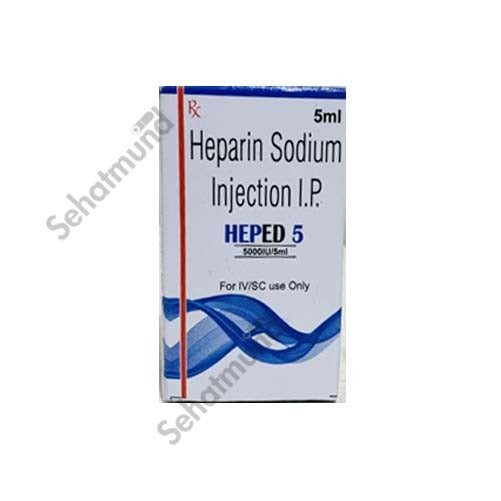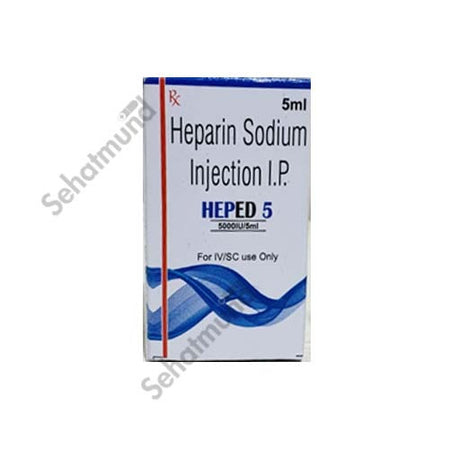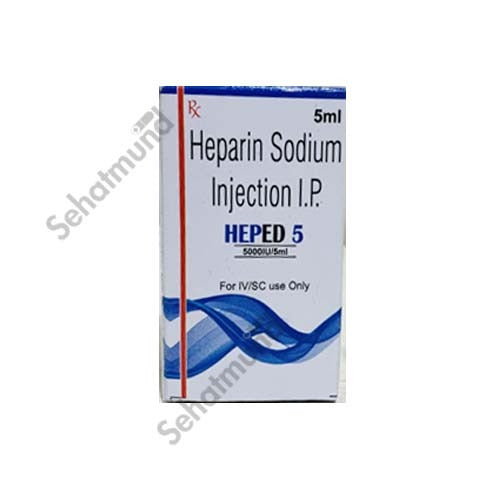Heped 5 Injection 5000IU/5ml
Regular price
Rs.0.00 PKR
inc. VAT
Couldn't load pickup availability
You can promote by sharing on social networks on the links.
Product Description
Product Name: Heped 5 Injection 5000IU/5ml
Product Form: Injection
Pack Size: 5ml
Manufactured By: Samarth Life Sciences
Used For:
-
Prevention of Blood Clots:
- During surgeries (e.g., heart surgery or orthopedic procedures) to reduce the risk of clotting.
- In hospitalized patients who are immobilized or have limited mobility.
- In patients with a history of clotting disorders or in those at high risk for clot formation (e.g., after stroke, heart attack, or prolonged bed rest).
-
Treatment of Blood Clots:
- Deep Vein Thrombosis (DVT): Clots that form in the deep veins, typically in the legs.
- Pulmonary Embolism (PE): Clots that travel to the lungs, potentially causing a life-threatening blockage.
- Acute Coronary Syndrome (ACS): To manage clots in patients with unstable angina or heart attacks.
-
Cardiovascular Procedures:
- During hemodialysis or cardiopulmonary bypass to prevent clotting in the blood or machinery.
- Maintenance of intravenous (IV) catheters to prevent clot formation in the catheter.
Side Effects:
Common Side Effects:
-
- Bruising or swelling at the injection site.
- Mild bleeding (e.g., from gums, nosebleeds, or minor cuts).
-
Serious Side Effects:
- Excessive bleeding: This can occur anywhere in the body, and symptoms may include prolonged bleeding from cuts, red or black stools, or coughing up blood.
- Heparin-Induced Thrombocytopenia (HIT): A rare but serious immune reaction causing a decrease in platelet count, which paradoxically increases the risk of clotting.
- Osteoporosis: Long-term use can lead to bone thinning and fractures.
- Allergic reactions: Skin rash, hives, or difficulty breathing (anaphylaxis in rare cases).
Precautions:
-
Medical History:
- Inform your healthcare provider if you have any history of bleeding disorders, liver disease, kidney disease, or hypertension.
- Caution is needed in patients with a history of stroke, recent surgery, or active bleeding (e.g., ulcers or head trauma).
-
Monitoring:
- Regular blood tests, such as activated partial thromboplastin time (aPTT) or anti-Xa assay, are necessary to monitor heparin's effect and adjust dosing.
- Careful monitoring is required in elderly patients or those with liver/kidney problems.
-
Drug Interactions:
- Heparin interacts with other medications that affect bleeding, such as aspirin, NSAIDs, and warfarin.
- Careful management is required when taking other anticoagulants or antiplatelet drugs.
-
Pregnancy:
- Heparin is generally considered safe during pregnancy since it does not cross the placenta, but it should be used under medical supervision.
-
Activity:
- Avoid activities that could cause injury and increase the risk of bleeding (e.g., contact sports).



